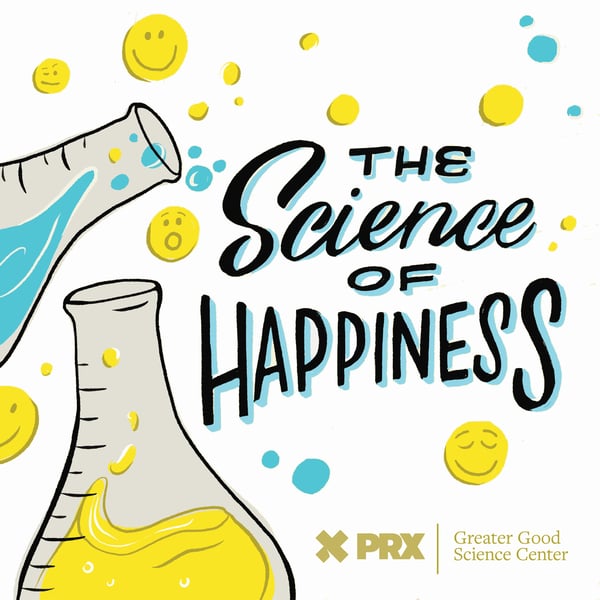Happiness Break: A Breathing Technique To Help You Relax, with Dr. David Spiegel (Cyclic Sighing)
The Science of Happiness
PRX and Greater Good Science Center
4.4 • 1.9K Ratings
🗓️ 3 October 2024
⏱️ 9 minutes
🧾️ Download transcript
Summary
Dr. David Spiegel guides you through cyclic sighing, a breathwork practice that helps reduce stress and anxiety.
Summary: Dr. David Spiegel guides you through a simple yet powerful breathwork practice that can help reduce stress, anxiety, and boost overall well-being. Backed by Stanford research, this simple technique uses slow, controlled exhales to calm the nervous system and improve overall well-being.
Transcript: https://tinyurl.com/3dtwyk44
Time: 5 minutes
- Prepare: Find a comfortable seated or standing position in a quiet environment. Relax your shoulders and jaw.
- First Inhale: Inhale slowly and deeply through your nose. Start with your abdomen, allowing it to expand (diaphragmatic breathing) as you fill your lungs about halfway. Hold this breath briefly.
- Second Inhale: Continue inhaling through your nose, now expanding your chest to completely fill your lungs. Hold this combined breath (abdomen and chest filled) for a moment.
- Exhale: Exhale slowly and completely through your mouth. Make sure the exhale is gentle and lasts about twice as long as the combined inhales.
- Repeat the Cycle: Repeat the inhale sequence for a total of 3 cycles (or as desired): Start with a diaphragmatic inhale through your nose, expanding your abdomen. Follow with a chest expansion inhale through your nose to fill your lungs completely. Hold briefly after each combined inhale. Exhale slowly and completely through your mouth, ensuring it's twice as long as the inhales.
- Reflect and Relax: After completing the cycles, take a moment to observe how your body feels. Notice any sensations of relaxation, reduced tension, or a calmer state of mind.
Guest: Dr. David Spiegel is Willson Professor and Associate Chair of Psychiatry & Behavioral Sciences at Stanford University School of Medicine. He is also the co-founder of the clinically backed self-hypnosis app Reveri.
Read Dr. Spiegel’s cyclic sighing study here: https://tinyurl.com/mrxbkyr2
Related Science of Happiness episodes:
Breathe Away Anxiety (Cyclic Sighing): https://tinyurl.com/3u7vsrr5
How To Tune Out The Noise: https://tinyurl.com/4hhekjuh
Related Happiness Break episodes:
A Mindful Breath Meditation, With Dacher Keltner: https://tinyurl.com/mr9d22kr
Follow us on Instagram: @scienceofhappinesspod
Transcript
Click on a timestamp to play from that location
| 0:00.0 | Hi, I'm Dacker Keltner, and welcome to Happiness Break, where we explore practices that can |
| 0:10.5 | bring more joy and peace to your day. |
| 0:14.2 | The concept of using breath to regulate the nervous system is a well-established principle in many |
| 0:19.8 | traditional Eastern practices, including those found in Indian, Tibetan, and Chinese traditions. |
| 0:26.2 | This week, we're trying a breathing technique that incorporates a lot of those time-honored |
| 0:30.6 | principles, cyclic sighing. |
| 0:33.8 | Cyclic sighing involves inhaling deeply |
| 0:36.2 | through your nose, filling your lungs, |
| 0:39.0 | and then exhaling slowly through your mouth. This slow extended exhale is what makes cyclic sighing |
| 0:46.7 | so relaxing. Today we're guided by Dr. David Spiegel, the director of the Center |
| 0:52.0 | on Stress and Health at Stanford University. |
| 0:55.1 | His research suggests that cyclic sighing lowers your breathing rate, which can help reduce |
| 1:00.4 | stress and anxiety by calming the nervous system and improving blood flow to the brain. |
| 1:07.0 | Now let's dive into a short cyclic sighing practice led by Dr. Spiegel. |
| 1:12.6 | Take a moment to settle in, and let's find some calm together. |
| 1:17.0 | Breathe is an intrinsic part of living, but it's an unusual mind-body phenomenon because |
| 1:29.0 | the way we breathe is right at the edge of conscious and unconscious processing. |
| 1:35.8 | We obviously can control how we breathe, we can decide to inhale and exhale and how often to do it. |
| 1:42.4 | And yet most of the time we do it automatically. |
| 1:45.0 | So the way breathing is controlled in the brain, where it is controlled is right in the |
| 1:51.8 | medulla between the mind and the spinal cord and body and it's a way |
| 1:57.4 | in which the brain can regulate its own level of arousal by changing the balance of |
... |
Please login to see the full transcript.
Disclaimer: The podcast and artwork embedded on this page are from PRX and Greater Good Science Center, and are the property of its owner and not affiliated with or endorsed by Tapesearch.
Generated transcripts are the property of PRX and Greater Good Science Center and are distributed freely under the Fair Use doctrine. Transcripts generated by Tapesearch are not guaranteed to be accurate.
Copyright © Tapesearch 2025.

